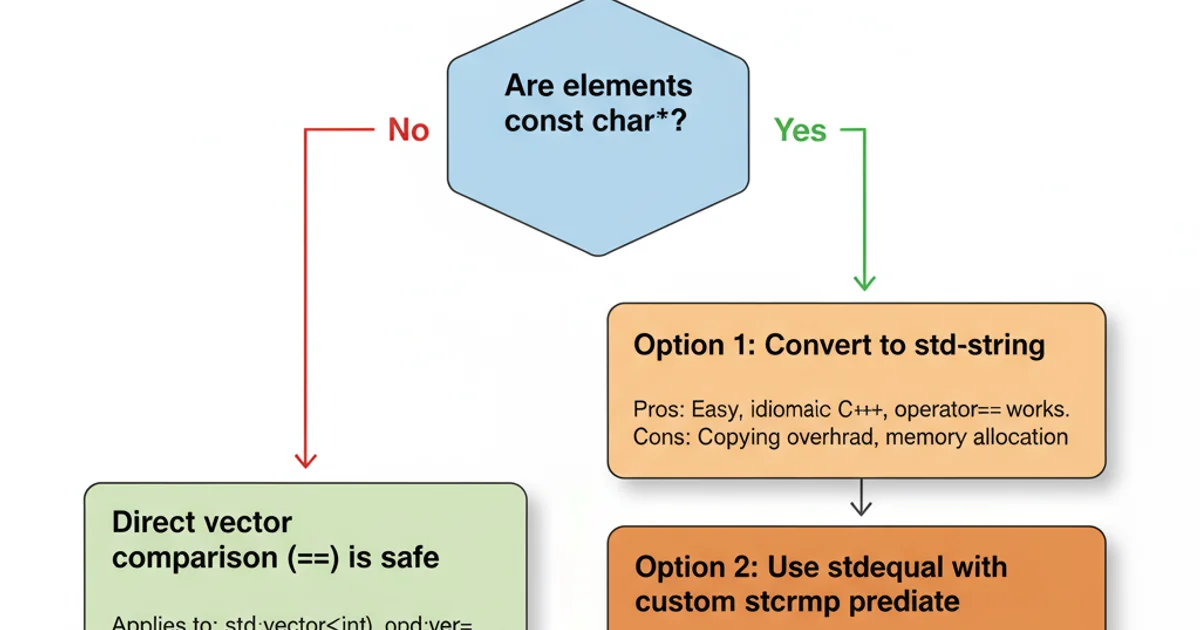How to compare a vector of const char[]
Categories:
Comparing Vectors of const char* in C++

Learn the nuances of comparing vectors containing C-style strings (const char*) in C++. This article covers common pitfalls and provides robust solutions using std::string and custom comparators.
Comparing two std::vector<const char*> objects in C++ is not as straightforward as comparing vectors of primitive types or std::string. The core issue lies in how C-style strings (const char*) are handled: a const char* variable stores a pointer to the beginning of a character array, not the string data itself. Therefore, a direct comparison of const char* values compares memory addresses, not the lexical content of the strings.
The Pitfall of Direct Pointer Comparison
When you compare two std::vector<const char*> using the == operator, or when you compare individual const char* elements directly, C++ performs a pointer comparison. This means it checks if the pointers point to the exact same memory location. Unless the strings are literally the same object in memory (which is rare for dynamically allocated or literal strings that happen to have the same content), this comparison will almost always yield false, even if the strings have identical content.
#include <iostream>
#include <vector>
#include <cstring> // For strcmp
int main() {
const char* s1 = "apple";
const char* s2 = "apple"; // s1 and s2 might point to different memory locations
if (s1 == s2) {
std::cout << "Pointers are equal (unlikely for different literals)" << std::endl;
} else {
std::cout << "Pointers are not equal (expected)" << std::endl;
}
// Comparing content using strcmp
if (std::strcmp(s1, s2) == 0) {
std::cout << "String content is equal" << std::endl;
} else {
std::cout << "String content is not equal" << std::endl;
}
std::vector<const char*> vec1 = {"hello", "world"};
std::vector<const char*> vec2 = {"hello", "world"};
// This will compare pointers within the vectors, not string content
if (vec1 == vec2) {
std::cout << "Vectors are equal (by pointer comparison - unlikely)" << std::endl;
} else {
std::cout << "Vectors are not equal (by pointer comparison - expected)" << std::endl;
}
return 0;
}
Demonstration of pointer comparison versus content comparison for const char*.
== comparison for const char* if you intend to compare string content. It will lead to subtle and hard-to-debug errors.Robust Comparison Strategies
To correctly compare vectors of C-style strings, you need to ensure that the string content is compared, not just their memory addresses. There are several effective ways to achieve this, each with its own trade-offs.
1. Convert to std::string
The most idiomatic C++ approach is to convert your const char* elements to std::string. std::string objects correctly overload the == operator for content comparison, and std::vector<std::string> also provides a content-based == operator.
#include <iostream>
#include <vector>
#include <string> // For std::string
#include <algorithm> // For std::equal
int main() {
std::vector<const char*> c_str_vec1 = {"apple", "banana", "cherry"};
std::vector<const char*> c_str_vec2 = {"apple", "banana", "cherry"};
std::vector<const char*> c_str_vec3 = {"apple", "grape", "cherry"};
// Convert to std::vector<std::string> for easy comparison
std::vector<std::string> str_vec1(c_str_vec1.begin(), c_str_vec1.end());
std::vector<std::string> str_vec2(c_str_vec2.begin(), c_str_vec2.end());
std::vector<std::string> str_vec3(c_str_vec3.begin(), c_str_vec3.end());
if (str_vec1 == str_vec2) {
std::cout << "str_vec1 and str_vec2 are equal (content-wise)" << std::endl;
} else {
std::cout << "str_vec1 and str_vec2 are not equal" << std::endl;
}
if (str_vec1 == str_vec3) {
std::cout << "str_vec1 and str_vec3 are equal (content-wise)" << std::endl;
} else {
std::cout << "str_vec1 and str_vec3 are not equal" << std::endl;
}
return 0;
}
Comparing vectors after converting const char* to std::string.
std::string is generally the recommended approach in modern C++ as it handles memory management and comparisons safely and efficiently.2. Custom Comparator with std::equal
If you cannot or do not want to convert the entire vector to std::string (e.g., due to performance concerns for very large vectors or if the const char* are owned elsewhere), you can use std::equal with a custom comparison predicate. This predicate will use std::strcmp to compare the C-style strings.
#include <iostream>
#include <vector>
#include <cstring> // For strcmp
#include <algorithm> // For std::equal
// Custom comparison predicate for const char*
bool compare_c_strings(const char* s1, const char* s2) {
return std::strcmp(s1, s2) == 0;
}
int main() {
std::vector<const char*> vec1 = {"alpha", "beta", "gamma"};
std::vector<const char*> vec2 = {"alpha", "beta", "gamma"};
std::vector<const char*> vec3 = {"alpha", "delta", "gamma"};
std::vector<const char*> vec4 = {"alpha", "beta"}; // Different size
// Compare vec1 and vec2 using std::equal with custom predicate
if (vec1.size() == vec2.size() &&
std::equal(vec1.begin(), vec1.end(), vec2.begin(), compare_c_strings)) {
std::cout << "vec1 and vec2 are equal (content-wise)" << std::endl;
} else {
std::cout << "vec1 and vec2 are not equal" << std::endl;
}
// Compare vec1 and vec3
if (vec1.size() == vec3.size() &&
std::equal(vec1.begin(), vec1.end(), vec3.begin(), compare_c_strings)) {
std::cout << "vec1 and vec3 are equal (content-wise)" << std::endl;
} else {
std::cout << "vec1 and vec3 are not equal" << std::endl;
}
// Compare vec1 and vec4 (different sizes)
if (vec1.size() == vec4.size() &&
std::equal(vec1.begin(), vec1.end(), vec4.begin(), compare_c_strings)) {
std::cout << "vec1 and vec4 are equal (content-wise)" << std::endl;
} else {
std::cout << "vec1 and vec4 are not equal (different sizes)" << std::endl;
}
return 0;
}
Using std::equal with a custom predicate for const char* comparison.

Decision flow for comparing vectors of const char*.
3. Using std::string_view (C++17 and later)
For C++17 and newer, std::string_view offers an efficient way to handle string comparisons without owning the string data. It's a non-owning reference to a string, which can be constructed from const char* and provides content-based comparison. This can be a good middle-ground if you need performance similar to const char* but with the safety and convenience of std::string's comparison semantics.
#include <iostream>
#include <vector>
#include <string_view> // For std::string_view (C++17+)
#include <algorithm> // For std::equal
int main() {
std::vector<const char*> c_str_vec1 = {"one", "two", "three"};
std::vector<const char*> c_str_vec2 = {"one", "two", "three"};
std::vector<const char*> c_str_vec3 = {"one", "four", "three"};
// Convert to std::vector<std::string_view> for comparison
// Note: Ensure the underlying char* data outlives the string_views
std::vector<std::string_view> sv_vec1;
for (const char* s : c_str_vec1) {
sv_vec1.emplace_back(s);
}
std::vector<std::string_view> sv_vec2;
for (const char* s : c_str_vec2) {
sv_vec2.emplace_back(s);
}
std::vector<std::string_view> sv_vec3;
for (const char* s : c_str_vec3) {
sv_vec3.emplace_back(s);
}
if (sv_vec1 == sv_vec2) {
std::cout << "sv_vec1 and sv_vec2 are equal (content-wise)" << std::endl;
} else {
std::cout << "sv_vec1 and sv_vec2 are not equal" << std::endl;
}
if (sv_vec1 == sv_vec3) {
std::cout << "sv_vec1 and sv_vec3 are equal (content-wise)" << std::endl;
} else {
std::cout << "sv_vec1 and sv_vec3 are not equal" << std::endl;
}
return 0;
}
Comparing vectors using std::string_view (C++17+).
std::string_view, be extremely careful about the lifetime of the underlying character data. std::string_view does not own the data, so if the const char* it refers to goes out of scope or is deallocated, the string_view becomes dangling.